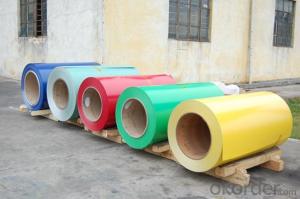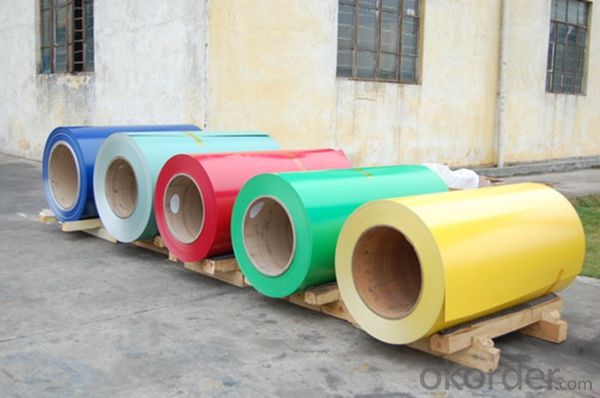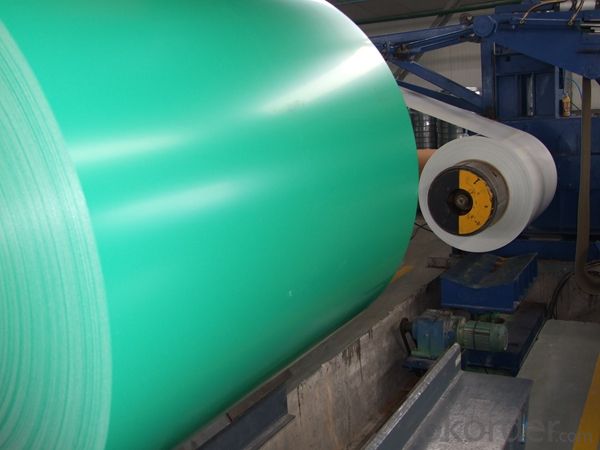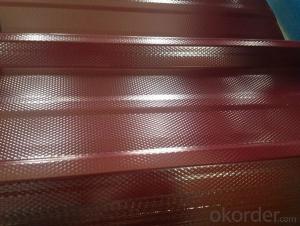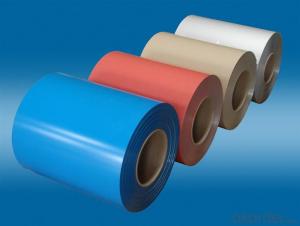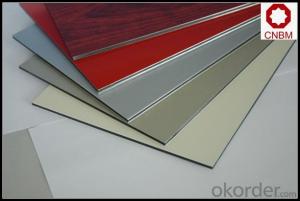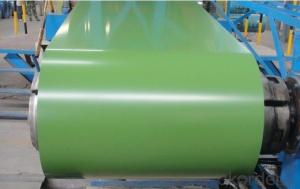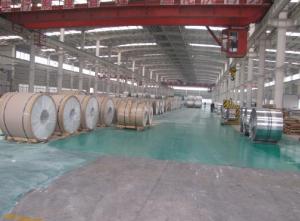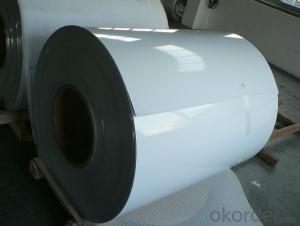Aluminum Coils Canada - Color Coating Aluminum Coils Made in China
- Loading Port:
- Shanghai
- Payment Terms:
- TT OR LC
- Min Order Qty:
- 5 m.t.
- Supply Capability:
- 10000 m.t./month
OKorder Service Pledge
OKorder Financial Service
You Might Also Like
Specification
1. Specification of Color coating Aluminum Coils Made in China
Alloy: 1050, 1060, 1100, 3003, 3004, 3005, 3105, 5005, 5052, 5083, 5754
2) Temper: Various status
3) Thickness: 0.3-150mm
4) Width: 300-1950mm
5) Length: Under9500mm/ Coil
6) Weight: 2.5-5.0 tons per coil
7) Dimensions and weight can be produced according to clients' specifications.
8) Inner Diameter: 505mm, 605mm
9) Packing: Export standard, wooden pallet.
10) Delivery time: 20 days
11) Minimum order quantity: 5 tons per size.
12) The term of payment: T/T, irrevocable L/C at sight.
13) Surface: Bright
14)Origin: China
2. Application of Color coating Aluminum Coils Made in China
(1).Interior: wall cladding, ceilings, bathrooms, kitchens and balconies, shutters, doors...
(2).Exterior: wall cladding, facades, roofing, canopies, tunnels,column covers , renovations...
(3).Advertisement: display platforms, signboards, fascia, shop fronts...
3. Feature of Color coating Aluminum Coils Made in China
*Such coil is specially designed to replace aluminum ingot, due to the high export tax of aluminum ingot, the coil has better price than ingot.
*This type of coil can fit customer's remelting furnace just like ingot, no need to make any change to the production line that was previously used for ingot. The standard coil size and weight is very suitable for the feed gate of furnace.
*This type of coil causes less material wastage than ingot when remelted.
*Our coil is made directly from ore, no need to go though the ingot making process, quality is much better than other suppliers who use ingot scrap to make coil.
Be free from Oil Stain, Dent, Inclusion, Scratches, Stain, Oxide Dicoloration, Breaks, Corrosion, Roll Marks, Dirt Streaks and other defect which will interfere with use
4. Certificate:
SGS and ROHS(if client request, paid by client), MTC(plant provided), Certificate of Origin(FORM A, FORM E, CO), Bureau Veritas and SGS (if client request, paid by client), CIQS certificate
5. Image of Color coating Aluminum Coils Made in China
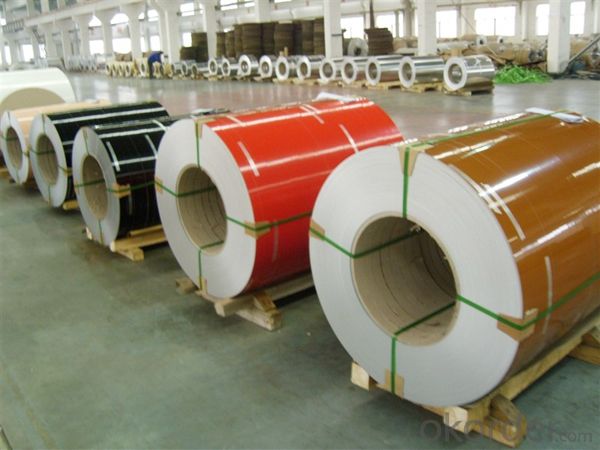
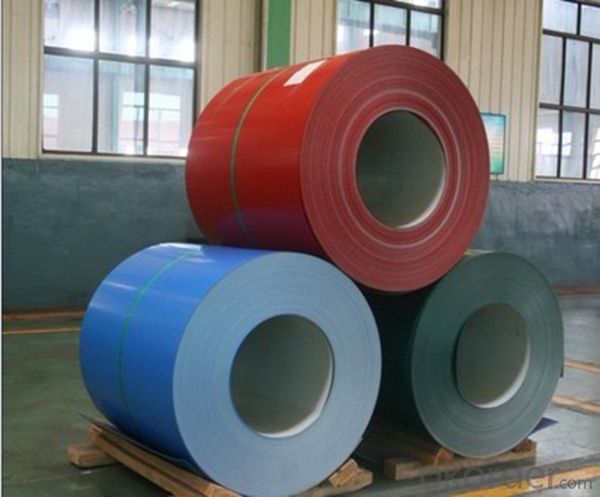
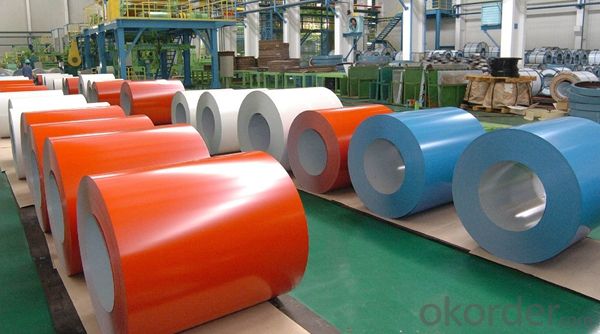
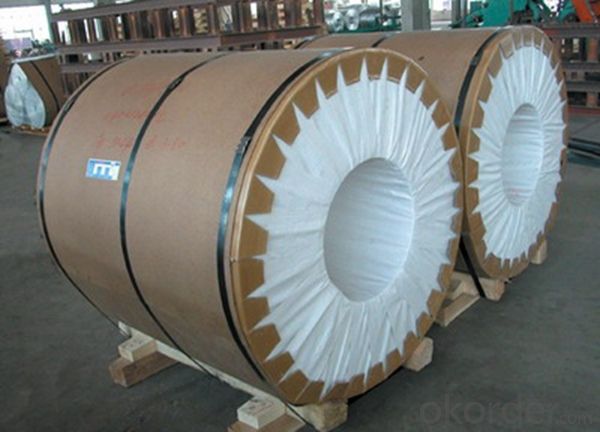
6. Package and shipping of Color coating Aluminum Coils Made in China
eye to wall
eye to the wall
with wood pallet (wooded case also available)
7. FAQ
1) What is the delivery time?
Dpends on actual order, around 20 to 35 days
2)What is the QC system:
We have QC staff of 20 persons and advanced equipment, each production is with MTC traced from Aluminum ingot lot.
3) What market do you mainly sell to?
Australia, America, Asia, Middle East, Western Europe, Africa etc
- Q: Why the aluminum-plastic panel?processed by color aluminum coil peel off paint?
- Generally speaking, aluminum-plastic panel will not peel off paint. If it does happen, the quality of the aluminum-plastic panel is very poor.
- Q: How to calculate the wall thickness with the gross weight of aluminum coil known?
- Gross weight*density=volume volume÷(aluminum sheet *width)=thickness
- Q: aluminum foil production of ERP software, requiring a comprehensive production process, and have special assistance to pre operation, the best price is reasonable
- Baidu, Inc., a China military there, here not to send.
- Q: I know aluminum has gone up in price. I know very little about gutter material. Durability, leaf guards, etc. I am on a limited income, and need the most and best for my few bucks. Thanks Lee
- Go with aluminum seamless gutter ,plastic only comes in 10 ft lenghts so you would have more seams which means more chances of it leaking A easy formula to figure out whataluminumn gutter will cost is and it goes by linear footage so measure your house where gutters would go and then add 12 LF for each downspout you will need about 4 and you have the total and if you call a contractor they will give you a free estimate but it should cost you about $2-$3 a Linear foot everyone is hurting for work so get a couple bids and go back and forth for the best price Also leaf guard is expensive about $4 a LF look for similar products that are cheaper hope this helps
- Q: Are there any limitations on the bending or shaping of aluminum coils?
- Yes, there are limitations on the bending or shaping of aluminum coils. Aluminum is a relatively soft and malleable metal, which makes it suitable for bending and shaping. However, it does have some limitations. Firstly, the thickness of the aluminum coil can affect its bendability. Thicker aluminum coils are generally more difficult to bend or shape compared to thinner ones. This is due to the increased resistance to deformation in thicker materials. Secondly, the temper or hardness of the aluminum coil can also impact its bendability. Different tempers, such as soft, half-hard, or hard, have varying degrees of malleability. Soft tempers are easier to bend, while harder tempers require more force and may be prone to cracking or breaking during bending. Additionally, the design and complexity of the desired bend or shape can also impose limitations. Sharp bends or complex shapes may cause the aluminum coil to crack or deform, especially if it is not properly supported or if the bending radius is too small. Lastly, the presence of any impurities, defects, or alloying elements in the aluminum coil can affect its bendability. These factors can lead to inconsistencies in the material's mechanical properties, making it more prone to cracking or breaking during bending or shaping. Therefore, while aluminum coils offer flexibility for bending and shaping, it is important to consider the thickness, temper, design, and quality of the material to ensure successful and safe manipulation.
- Q: Are aluminum pie pans and aluminum foil considered green products? They are most certainly recyclable. Thanks.?
- Surely that depends on how 'green' you want to be. There's the 'end user green' which just says, 'well this is recyclable so it's green', or there's the whole subject of whether we should be encouraging throw away products which rely on unsustainable minerals or rock such as the bauxite that is used to make aluminium (aluminum). And what would be the effect if we said no more aluminium, and bauxite was no longer allowed to be mined? What happens to those people who earn a living from mining it, and what do we replace it with? Green is a very complicated concept!
- Q: Can aluminum coils be used in solar panel applications?
- Indeed, solar panel applications can make use of aluminum coils. Aluminum, a lightweight and robust substance, finds widespread use across diverse industries, including the solar panel industry. The base material for solar panels often consists of aluminum coils owing to their corrosion resistance, exceptional thermal conductivity, and excellent electrical conductivity. These attributes render aluminum coils ideal for efficiently transmitting heat and electricity within solar panels, thereby guaranteeing optimal performance and efficiency. Additionally, aluminum stands as a highly sustainable material, as it can be readily recycled, making it an environmentally conscious option for solar panel applications.
- Q: I'm ball milling aluminum into powder and I have filled the canister with some water to prevent the aluminum from igniting. The powder has begun to dissolve in the water. I'd like to know the best way to remove the dissolved aluminum from the water so I can get to the powder.There is around of cup of water in the canister, just to give an idea of the situation.
- Aluminum does not dissolve in water. In the presence of oxygen (and water), it becomes Aluminum Hydroxide which is worthless pyrotechnically. To boil the water off without heat, use a vacuum pump. You may be involving yourself in a very dangerous enterprise, especially since you don't seem to know anything about chemistry. If you are experimenting, I would keep the quantities very low, a gram or so.
- Q: What are the standard sizes of aluminum coils?
- The standard sizes of aluminum coils can vary depending on the specific industry and application. However, there are a few common standard sizes that are widely used. For general industrial applications, the standard width of aluminum coils ranges from 36 inches to 72 inches. The thickness of these coils typically varies between 0.018 inches to 0.125 inches. The length of the coils can vary, but it is commonly around 1,000 feet or more. In the construction industry, the standard sizes of aluminum coils can be different. The width can range from 24 inches to 48 inches, and the thickness can be between 0.019 inches to 0.032 inches. The length of these coils can also vary depending on the specific project requirements. It is important to note that these sizes are just general guidelines and can vary depending on the specific manufacturer, industry requirements, and customer preferences. It is always recommended to consult with the manufacturer or supplier to determine the exact standard sizes available for aluminum coils in your specific industry.
- Q: This is not for around the house. It is for my lab. I am pretty sure these one wires are Aluminum, but I need the connector they were made with and the power cable is copper. Would it be okay to still try to join the two.
- yes but use wire nuts
Send your message to us
Aluminum Coils Canada - Color Coating Aluminum Coils Made in China
- Loading Port:
- Shanghai
- Payment Terms:
- TT OR LC
- Min Order Qty:
- 5 m.t.
- Supply Capability:
- 10000 m.t./month
OKorder Service Pledge
OKorder Financial Service
Similar products
Hot products
Hot Searches
Related keywords
